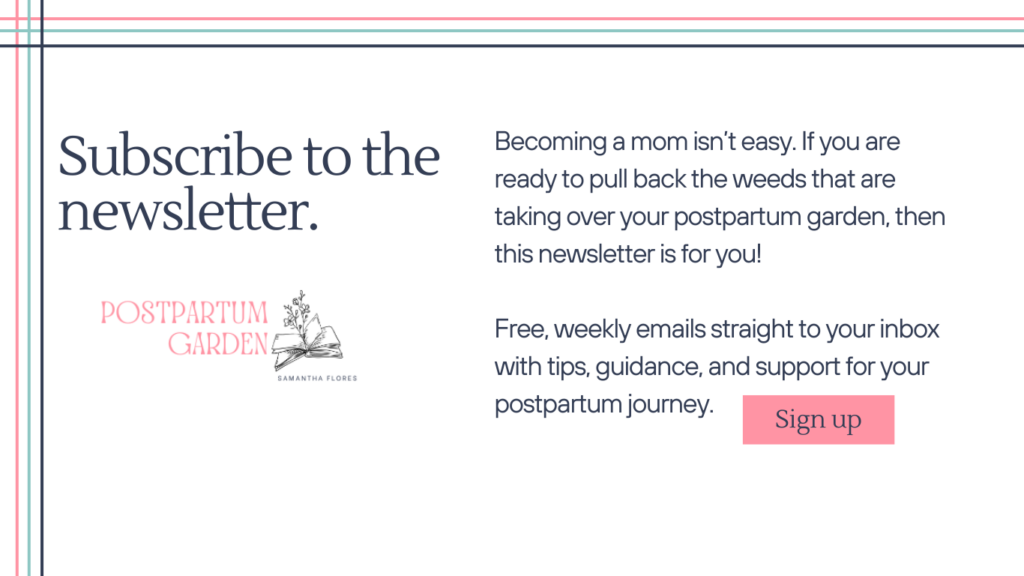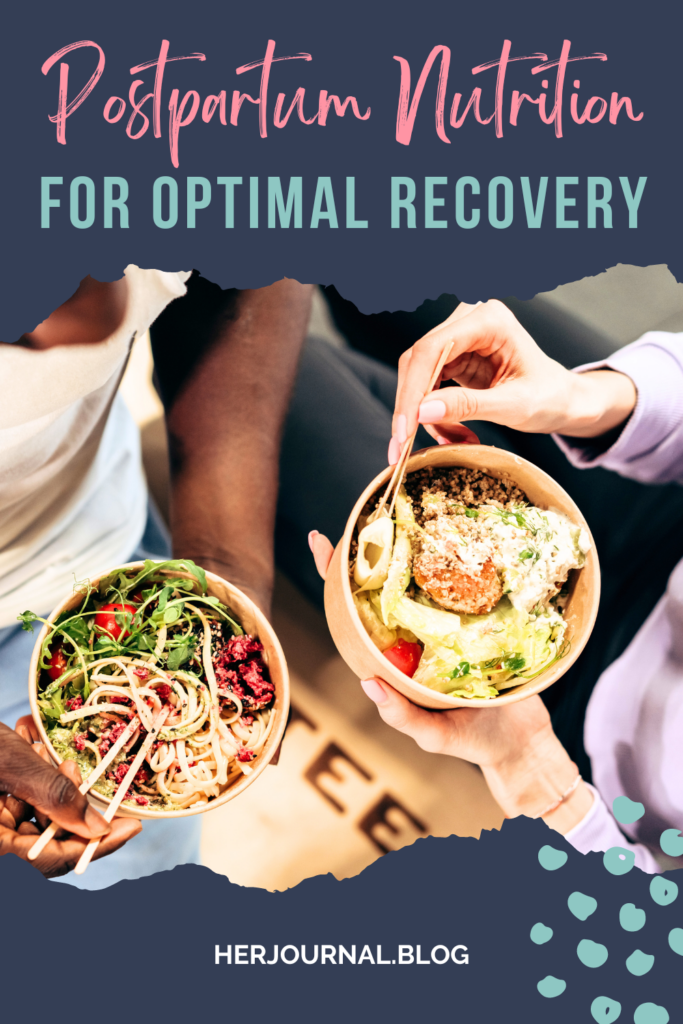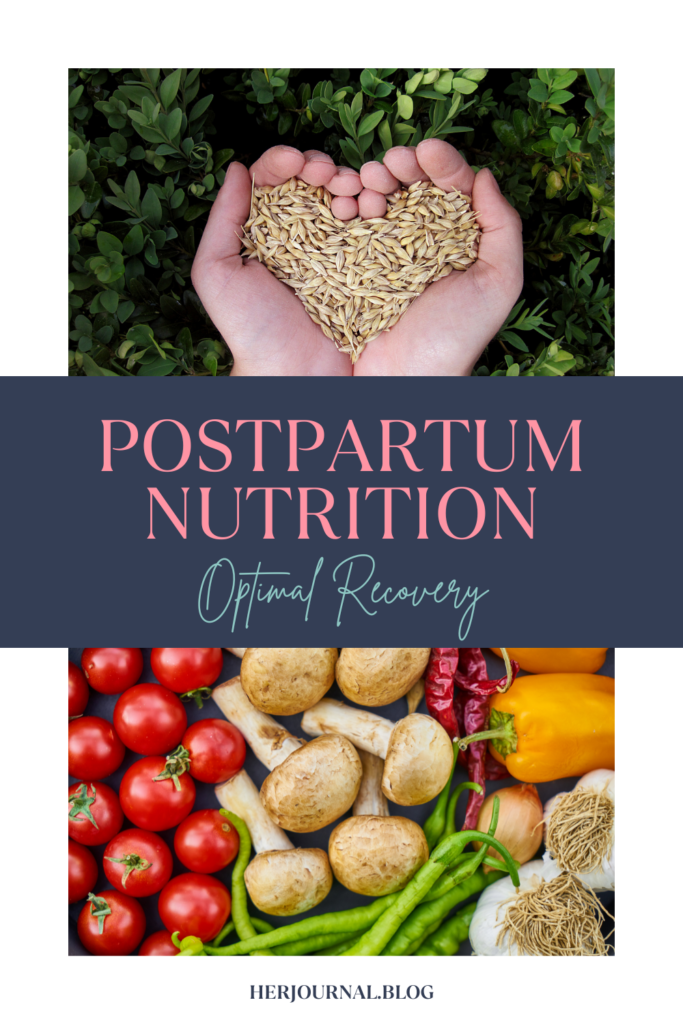We may earn money or products from the companies mentioned in this post.
After giving birth, it seems like it’s a race to lose the baby weight and get back to your pre-pregnancy size. Many moms get into this mindset that they have to fit back into their jeans immediately and they lose out on learning about postpartum nutrition. Unfortunately, mothers today are faced with a society that praises women for “bouncing back” instead of giving resources to help them flourish during their postpartum healing.
As a mother of three, I have fallen into the trap of trying to make my body look like it didn’t just grow and birth an entire human and placenta. This was the case for my first two births, but not with my third. By the third one, I was more experienced and gentle with myself.
If you are an expecting mom or a new mom, it’s important to learn how to focus on your nutrition even after having your baby. This has nothing to do with whether you are breastfeeding or formula feeding. Instead, this has everything to do with providing the nutrients for your body that continue to be depleted even after giving birth. Focus on postpartum nutrition so that you can be present for your family.
Related: The First Month Postpartum: What to Expect After Birth

What is Postpartum Nutrition?
Imagine that you broke your arm. You wouldn’t continue to use that broken arm as if nothing ever happened. Instead, you would go to the hospital, get x-rays, and potentially get a cast. Afterward, you would follow your doctor’s orders to keep your cast on for however many weeks and go easy on any activities that you do. This would give you the best opportunity for full healing so that you can use that arm to its full potential in the future.
Now, imagine instead that this broken arm is your postpartum body. It has been through the trauma of giving birth. It needs time, rest, and nutrition to heal and recover properly. To avoid any setbacks in your recovery, focusing on your postpartum nutrition is critical.
What Your Postpartum Body Needs
Your body has been depleted after giving birth and needs to restore nutrients and minerals. The following list consists of recommended nutrients and minerals you should focus on after birth:
- Iron— As you can imagine, your body has lost (and continues to lose) a significant amount of blood after birth. To avoid postpartum anemia (which has been linked to postpartum depression), increase your iron intake postpartum.
- Protein— Protein helps support tissue healing after birth.
- Hydration— Hydration helps with many aspects of postpartum healing. Increasing your water intake in addition to electrolytes helps support your body’s physical recovery, mood and energy, digestive health, swelling, constipation, and more.
- Choline— Choline helps support your brain and nervous system in addition to your baby’s brain and nervous system. It also supports your metabolism, blood pressure, and mood.
- Collagen— Collagen helps support your joints, pelvic floor tissue, skin elasticity, and postpartum hair.
- Trace Minerals— Trace minerals include zinc, iodine, and selenium. Zinc is important, especially for nursing mothers, to increase the quality of breastmilk, which then helps infants grow and develop. Low levels of zinc are also linked to postpartum depression. Iodine is a component of thyroid hormones and selenium is important for your immune system, thyroid function, and decreasing your risk of postpartum depression.
Related: Postpartum Hormone Imbalance: How to Understand Your New Body

How to Support Your Postpartum Nutrition
All of this might seem overwhelming to have to remember during your postpartum journey. This is a result of a society that hasn’t been forthcoming with education for new mothers and a medical community that hasn’t prioritized postpartum health.
Fortunately, you don’t have to figure this part out alone. Yes, there are foods you can consume that will help you increase things like iron, protein, hydration, etc. However, the nutritional value in our foods has been on the decline due to depleted soils.
According to a study from the University of Texas at Austin’s Department of Chemistry and Biochemistry in 2004 published in the American College of Nutrition, data showed that 43 different fruits and vegetables produced “reliable declines” in the amount of protein, calcium, phosphorus, iron, riboflavin (vitamin B12), and vitamin C.
Because of this nutritional decline, we aren’t getting nearly as many nutrients and minerals as we need. Therefore, NEEDED was created to help women in all stages of life, especially in fertility, pregnancy, and postpartum. NEEDED offers radically better nutrition. You can try out any of their products using this link and get a special discount when you use code postpartumsam.
No more second-guessing if you are getting the right nutrients for your postpartum body and your baby. NEEDED offers the support you need for your postpartum nutrition.
Related: The 5-5-5 Postpartum Rule: What Is It and How to Use It
Other Questions New Moms Are Asking About Postpartum Nutrition
You are not alone when it comes to figuring out postpartum nutrition. Many new moms have been asking questions about it and you can find the answers below.

Why is postpartum nutrition important?
Postpartum nutrition helps optimize your healing and recovery. If you don’t take the time to allow part of your body to heal correctly, you risk having problems in the future that could be damaging or even fatal. Taking the time to recover and replenish your body with the nutrients it needs is critical.
Just because you can’t see the nutrient depletion in your body doesn’t mean it isn’t there. When you focus on postpartum nutrition, you will feel a noticeable difference in your recovery and your overall health.
Why is a woman’s nutrition important to her baby’s development?
You’ve heard it over and over: “You can’t pour from an empty cup.” This is especially true for your postpartum nutrition. If you are a nursing mother, you cannot give your baby the best nutrients he or she needs if you aren’t giving your own body these nutrients.
Even if you are not breastfeeding, it is still important to replenish your nutrients for the best mental health and physical health, which will be important for your baby’s development as well.
Related: The Postpartum Period: How to Survive After Birth
What are the consequences of poor maternal nutrition?
Poor postpartum nutrition can lead to an avalanche of consequences for both you and your baby. For starters, you won’t feel your best, which means you can’t be fully present for your baby. The outcome of poor nutrition can lead to mental health disorders, poor infant health, postpartum complications, and more.
What foods should I avoid postpartum?
Some of the foods you could consider avoiding include ultra-processed foods, too much caffeine, too much alcohol, high-sugar foods, and foods high in pesticides. You can obtain a full list of foods to avoid from your primary care provider.

Postpartum Nutrition is Essential to Recovery
In short, your recovery from birth relies heavily on your postpartum nutrition. I can’t stress enough that just because you can’t physically see the internal trauma your body has experienced during birth doesn’t mean it’s not there. If you don’t take care of yourself now, you will only set yourself up for challenges in the future.
Postpartum nutrition is essential for you and your baby. If it’s too tiresome to cook your own meals, ask friends and family to set up a meal train. In addition, you can avoid the guessing game by taking supplements such as the postpartum supplements offered through NEEDED and using code postpartumsam. This is your chance to give your body the best; don’t allow your needs to be put on the back burner.
Don’t forget to grab your copy of The Fourth Trimester: A Postpartum Depression Guide to help set you up for success during your postpartum journey. Every mom deserves to be taken care of, especially during postpartum.
Related: Postpartum Hair Loss: What to Expect and How to Help
Pin It!





